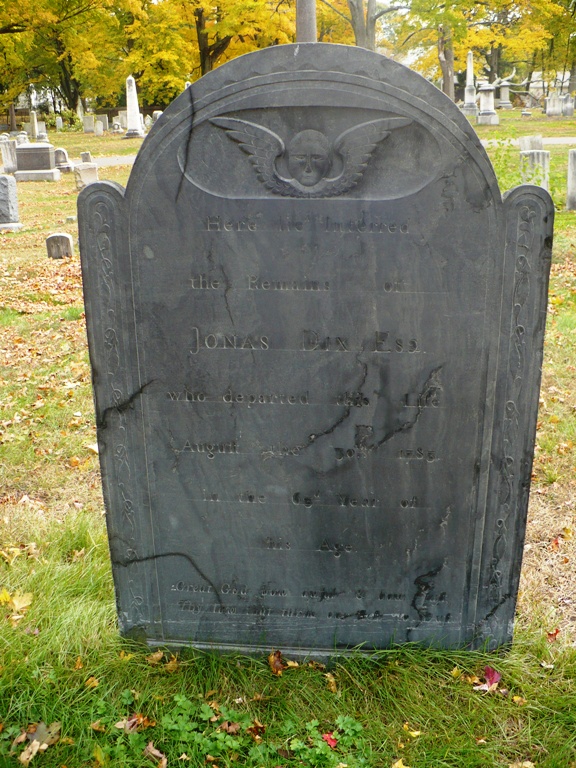Then, about three weeks later, the congress ordered him to deliver those three guns to Watertown.
That wasn’t the congress’s first dealing with Brown. Back in February, the rebel legislature had to consider “A petition of Abijah Browne and others, setting forth the irregularity of the choice of Jonas Dix, Esq., to represent the town of Waltham in this Congress.”
Other Waltham men led by Leonard Williams sent a petition supporting Dix (1721-1783, gravestone shown above courtesy of Find a Grave). Obviously, there was some sort of argument going on in Waltham. It might even have been over politics.
The congress decided to stay out of it. It decided that even if the first petition’s complaints were all true, they were “not sufficient to disqualify Jonas Dix.” So he remained in his seat, in power, with a (further?) reason to dislike Abijah Brown.
Those circumstances set the stage for another message to the congress, printed in Force’s American Archives, that followed the orders to Brown to hand over the cannon:
Whereas a number of the inhabitants in and about Waltham, in the County of Middlesex and Province aforesaid, having a deep sense of their obligations to the Honourable Committee for their services, upon information given, look upon themselves in duty bound, to represent to them in this publick manner, the repeated and publick insults and abuses that the Honourable Committee and Congress are from day to day treated with by one Abijah Brown, who calls himself Lieutenant-Colonel, who, from time to time, and in different company, in the most publick manner upon the road, and in publick houses, where company of strangers or town’s people are on any occasion assembled, taking such opportunity to declare, though in such profane language that we must be excused from repeating, viz: that the Congress had no power to do as they did; for all the power was and would be in the Army; and if the Congress behaved as they did, that within forty-eight hours the Army would turn upon the Congress, and they would settle matters as they pleased; that there would be nothing done but what would be done by the Army; and with respect to the General [Artemas Ward] and Committee, that they had no more right or power to give their orders to remove the cannon and stores from Waltham, than one John Stewart, who is a poor unhappy man, that is non compos mentis; hereby representing the General and Committees as a set of idiots and lunaticks, in order to lessen and bring into contempt the power and authority of the Province, at this very important day.Abijah Brown was clearly upset about being ordered by the Massachusetts army command to hand over the cannon he had been working on.
This conduct from one assuming rank in the Army, in and about Head-Quarters where the Army is, and his reasons for such conduct, we leave every one to judge for himself, &c.
We therefore would bumbly pray that your Honours would be pleased to take into your consideration this very dangerous matter, before it is too late, and before the seeds of discord and mutiny have taken too deep root, and take such steps to put an end to it, as well as to him, with regard to his being any way concerned in the Army, as your Honours in your wisdom shall see fit.
Abner Sanders, John Sanders, Jedediah White, Peter Ball, Eleazer Bradshaw, &c., of Waltham, and Captain Abijah Child, now in the Army, stand ready, upon any day ihat your Honours may appoint, to appear and give your Honours the fullest proofs of what is here set forth, though this is but in part.
Jonas Dix,
Nath’l Bridge,
Josiah Brown,
John Clark,
Selectmen of Waltham.
And Jonas Dix was clearly thinking Brown shouldn’t be in the Massachusetts army at all, especially at a lieutenant colonel’s rank.
TOMORROW: The congress plays referee.

No comments:
Post a Comment